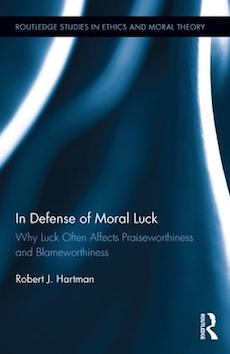Moral Luck Matters

The problem of moral luck is that there is a contradiction in our commonsense ideas about moral responsibility. In one strand of our thinking, we believe that a person can become more blameworthy by luck. For example, two reckless drivers manage their vehicles in the same way, and one but not the other kills a pedestrian. We blame the killer driver more than the merely reckless driver, because we believe that the killer driver is more blameworthy. Nevertheless, this idea contradicts another feature of our thinking captured in this moral principle: A person’s blameworthiness cannot be affected by that which is not within her control. Thus, our ordinary thinking about moral responsibility implies that the drivers are and are not equally blameworthy. In Defense of Moral Luck aims to make progress in resolving this contradiction. Robert J Hartman defends the claim that certain kinds of luck in results, circumstance, and character canpartially determine the degree of a person’s praiseworthiness and blameworthiness. He also explains why there is a puzzle in our thinking about moral responsibility in the first place if luck often affects a person’s praiseworthiness and blameworthiness. Furthermore, the book’s methodology provides a unique way to advance the moral luck debate with arguments from diverse areas in philosophy that do not bottom out in standard pro-moral luck intuitions.
– Why did I write the book? Philosophers tend to think that they can solve this puzzle in a single article. But since hundreds of articles have been written on the topic and papers continued to be published, I think that the way of progress is through a more systematic exploration. Surprisingly, there are very few books on the topic, and no book defending the position that I stake out. These reasons precipitated my writing In Defense of Moral Luck, says Hartman.
– The book will be comprehensible to undergraduate students in philosophy, but it is aimed primarily at graduate students and other professional philosophers who work in ethics, philosophy of action, epistemology, philosophy of law, or social/political philosophy.
